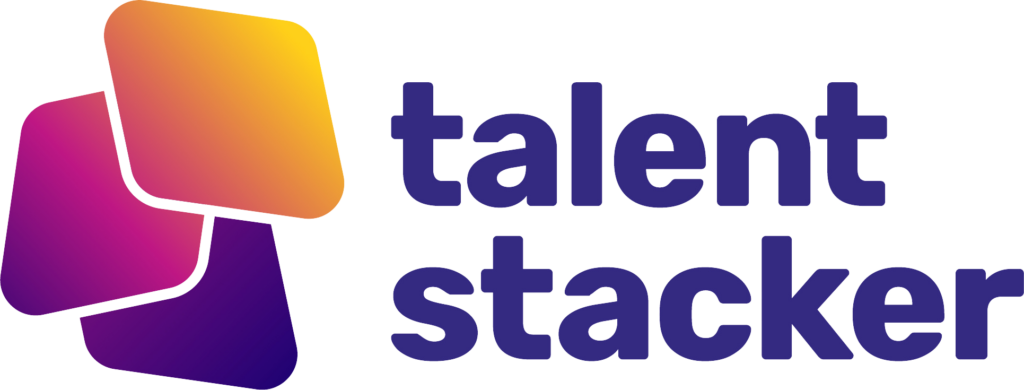Salesforce certification, one of the most in-demand skillsets today, is an incredible way to add to your Talent Stack. The high demand and lucrative nature of Salesforce careers make it an attractive option for those looking to switch careers. The most widely used CRM platform today, Salesforce jobs pay on average more than $65,000 per year, with Salesforce developers commanding $100,000 on average.
There are so many more substantial reasons other than just income potential alone to pursue a Salesforce certification. That is why we have put together the top 7 reasons you should consider a Salesforce career change, and how TalentStacker can launch you to success in 2024 and beyond.

Incredible Income Potential
When deciding on a career path, income potential is often a primary factor. Salesforce careers stand out for their impressive salaries, making them an attractive choice for career changers. The average median income in the United States is around $60,000 per year, but even the most basic Salesforce role, a Salesforce Administrator, earns an average salary of $118,000—nearly double the national average!
Here is a detailed breakdown of average salaries for various Salesforce roles:
- Salesforce Administrator: $118,000
- Salesforce Business Analyst: $131,500
- Salesforce Consultant: $141,000
- Salesforce Developer: $153,500
- Salesforce Project Manager: $138,250
- Salesforce Technical Architect: $163,500
These figures highlight the lucrative nature of Salesforce careers. Compared to other industries, Salesforce professionals consistently earn higher salaries, reflecting the high demand for these roles. For instance, a software developer in general might earn around $110,000, while a Salesforce Developer earns significantly more at $153,500.
Additionally, the rapid growth and stability of the Salesforce ecosystem ensure that these high-paying opportunities continue to expand. This makes pursuing a Salesforce career not only financially rewarding but also a secure and promising path for the future.

Work From Home Potential
Salesforce is a Cloud Platform, which means that everything about the tool is 100% online. As long as you have basic internet access and a computer, you are good to go. Some have even argued that an iPad (with a keyboard) would suffice for 90% of the day-to-day requirements.
Remote work is increasingly becoming a standard in the Salesforce ecosystem. According to recent industry reports, approximately 30% of entry-level Salesforce roles offer work-from-home options. This flexibility is a significant draw for many professionals seeking a better work-life balance.
For senior Salesforce roles, the trend towards remote work is even more pronounced. Over 70% of senior-level positions are fully remote. This is largely due to the high demand for experienced Salesforce professionals. When you reach a senior level (with 3+ years of experience), you often have the leverage to negotiate remote work arrangements. Employers recognize the value of retaining top talent and are more likely to accommodate remote work preferences to avoid losing one of their most indispensable resources.
In the broader tech industry, remote work is on the rise, with a significant shift towards flexible work arrangements spurred by the global pandemic. Salesforce roles align well with this trend, offering professionals the opportunity to work from anywhere, which enhances job satisfaction and productivity.

Salesforce Career Growth Path
One of the most attractive aspects of a Salesforce career is the significant growth potential. You typically begin as a junior resource, but you can move through this profession’s ranks very quickly. Unlike many fields that require years of dedication to achieve promotions and management positions, Salesforce careers are fast-paced and dynamic. Here are specific examples of typical career progression within Salesforce roles:
Year 1-2: Junior Administrator/Developer
Role: Starting as a Junior Salesforce Administrator or Developer, you’ll focus on learning the basics of Salesforce and gaining hands-on experience with the platform.
**Responsibilities: **Basic configuration, data management, and assisting senior team members with larger projects.
Skills Acquired: Salesforce fundamentals, problem-solving, basic coding (for developers), and understanding user requirements.
Year 2-5: Senior Administrator/Developer OR Salesforce Consultant
Role: Progressing to a Senior Administrator or Developer, or transitioning to a Salesforce Consultant role at a firm.
Responsibilities: Managing larger projects, implementing advanced configurations, providing strategic advice to clients (as a consultant), and leading small teams.
Skills Acquired: Advanced Salesforce capabilities, project management, client interaction, and specialization in areas like Sales Cloud, Service Cloud, or Marketing Cloud.
Year 5+: Salesforce Team Lead/Manager OR Salesforce Freelance/Independent Consultant
Role: Advancing to a Team Lead or Manager position, or moving into Salesforce Freelance/Independent Consulting.
Responsibilities: Leading teams, strategic decision-making, overseeing multiple projects, and mentoring junior staff. As a freelancer, managing your own client base and projects.
Skills Acquired: Leadership, strategic planning, business development (for freelancers), and expert-level Salesforce knowledge.
Flexible Career Options
Once you reach the Team Lead or Manager level, you can determine if you would like to continue working full-time or move into part-time or flexible roles that better fit your lifestyle goals. Many Salesforce professionals choose to become independent consultants, enjoying the flexibility to set their own schedules and select projects that interest them. Alternatively, you can continue working full-time in an exceptionally lucrative and flexible career, leveraging your expertise to climb even higher in the Salesforce ecosystem.
Stability and Demand
Stability of the Profession
Salesforce careers are among the fastest-growing and most stable professions globally. According to IDC, the Salesforce ecosystem is expected to create 4.2 million new jobs and generate $1.2 trillion in new business revenues worldwide between 2019 and 2024. This rapid growth highlights the immense demand for Salesforce professionals across various industries.
In the United States alone, Salesforce-related job postings have increased by 34% year over year, indicating robust job market growth. With an estimated 3.3 million Salesforce Professional jobs to be added to the Salesforce ecosystem by 2022, the opportunities in this field are vast and continue to expand. This means you don’t have to be one of the few to land a job in this space; the job opportunities are wide open and abundant.
These careers have been steadily on the rise for the past 15 years and show no sign of slowing. Salesforce is the 4th largest software company globally, yet it remains one of the least known, providing ample room for new professionals to enter and establish themselves. As more businesses adopt Salesforce to streamline their operations and improve customer relationships, the demand for skilled Salesforce professionals will continue to grow, ensuring long-term stability and job security.
Diverse Career Options
Salesforce Provides Diverse Career Options
One of the most appealing aspects of a Salesforce career is the diversity of roles and industries you can enter. Salesforce skills are in high demand across virtually every sector, meaning you’re not limited to a specific industry, department, or role. If you start in one industry and find it unfulfilling, you can easily transition to another where Salesforce is equally valuable.
Industries with High Demand for Salesforce Skills:
- Technology and Software: Salesforce is extensively used for customer relationship management (CRM) and sales automation in tech companies.
- Finance and Banking: Financial institutions leverage Salesforce for managing customer interactions, compliance, and personalized financial services.
- Healthcare: Hospitals and healthcare providers use Salesforce to manage patient data, appointments, and communications.
- Manufacturing: Salesforce helps manufacturers streamline operations, track inventory, and enhance customer service.
- Retail and E-commerce: Retailers use Salesforce for customer insights, marketing campaigns, and sales management.
- Non-Profit Organizations: Non-profits utilize Salesforce for donor management, volunteer coordination, and fundraising.
- Education: Educational institutions implement Salesforce for student management, alumni relations, and administrative processes.
Specific Salesforce Roles:
- Salesforce Administrator: Manages and customizes the Salesforce platform to meet the organization’s needs.
- Salesforce Developer: Designs and develops custom applications and integrations on the Salesforce platform.
- Salesforce Consultant: Provides expert advice and solutions to help organizations maximize their use of Salesforce.
- Salesforce Business Analyst: Analyzes business processes and implements Salesforce solutions to improve efficiency.
- Salesforce Project Manager: Oversees Salesforce projects, ensuring they are completed on time and within budget.
- Salesforce Marketing Cloud Specialist: Focuses on using Salesforce Marketing Cloud for creating and managing marketing campaigns.
- Salesforce Technical Architect: Designs scalable and high-performance solutions on the Salesforce platform.
- Salesforce Trainer: Educates employees and clients on how to use Salesforce effectively.
Salesforce offers a variety of niche paths within these roles. You can choose to specialize in areas such as Administration, Development, Consulting, Marketing, Sales, Field Services, Non-Profit, Education, and more. Salesforce has a tangible way to prove and showcase your skills through a series of certifications. Generally speaking, the more certifications you have, the more in demand you are, and the more income you stand to make. For a full list of the available certifications, follow this link.
By leveraging Salesforce skills, you can explore a multitude of career opportunities across different industries, ensuring a dynamic and fulfilling professional journey.

The Salesforce Ohana
This is an exciting topic for Salesforce beginners! Salesforce has what they refer to as their Ohana “family” culture. You will find hundreds of online Salesforce communities that are always willing to lend a helping hand with no strings attached. For example, suppose you find yourself in need of expert advice from a senior consultant. In that case, you simply pose your question in these community groups, and you will likely have a top of the line answer within a few hours, with references to documentation and how-to videos. You will also find an abundance of shared free learning materials with tools like Trailhead, detailed blogs, and YouTube channels to help you grow in your career. All those who share ask nothing in return other than to lean into the Ohana and give back.
Salesforce Company Culture
You may end up working directly for Salesforce, but odds are you will work for one of their more than 200,000 customers across the world. However, when working as a professional utilizing a specific product, it is important to know that you are enabling a reputable and respectable company. The good news is that Salesforce is incredibly strong in this regard.
Commitment to Equality
Salesforce, led by CEO Marc Benioff, is deeply committed to promoting equality and creating an inclusive workplace. One of their key initiatives is the Equal Pay Assessment, which began in 2015. Salesforce conducts regular salary audits to ensure that employees are paid equitably regardless of gender, race, or ethnicity. As a result of these audits, Salesforce has spent millions of dollars to address pay disparities, ensuring that all employees receive fair compensation.
Community Outreach
Salesforce is also known for its robust community outreach and philanthropy. The company’s 1-1-1 model dedicates 1% of its equity, 1% of its product, and 1% of employees’ time to charitable causes. This model has resulted in over 5 million hours of community service, more than $430 million in grants, and the donation of Salesforce products to over 45,000 non-profits and educational institutions.
One of Salesforce’s flagship community initiatives is its effort to combat homelessness in San Francisco, where the company is headquartered. Marc Benioff and Salesforce have pledged millions to support local organizations addressing homelessness and affordable housing. In 2018, Benioff personally donated $30 million to UCSF Benioff Homelessness and Housing Initiative, a research project aimed at finding evidence-based solutions to homelessness.
Salesforce also runs programs to support education and workforce development. Through its Futureforce program, Salesforce partners with educational institutions to provide internships, mentorship, and job opportunities for students from diverse backgrounds. The Salesforce.org Education Cloud provides tools to help educational institutions manage student relationships and drive student success.
Awards and Recognition
Salesforce’s dedication to equality and community outreach has earned it numerous accolades, including:
- Fortune – The Future Top 50
- Fortune – Best Workplaces for Giving Back
- Fortune – Best Workplaces for Parents
- Fortune – Best Workplaces for Millennials
- Fortune – Change the World List
- Forbes – Most Innovative Companies
- Forbes – Best Workplaces for Diversity
- Fairygodboss – Best Workplaces for Women
- Human Rights Campaign – Best Place to Work for LGBT Equality
These awards reflect Salesforce’s ongoing commitment to making a positive impact both within the company and in the broader community.
By joining the Salesforce ecosystem, you become part of a culture that values equality, community service, and innovation, aligning your career with a company that strives to make the world a better place.

The Bottom Line
Employers are looking for certified professionals, and Salesforce certification not only provides enormous value to your Talent Stack – you align yourself with the #1 CRM platform in the world that continues to grow year after year.
Here at Talent Stacker, we’ve created the FREE Salesforce 5 Day Challenge to help jump-start your Salesforce career in 5 days with Jonathan Mendonsa (ChooseFI) and Bradley Rice – one of the highest paid Salesforce Professionals in the world.
Each day you’ll get FREE expert coaching, step-by-step actionable advice, tips, and guidance to help you reach key milestones on your journey to a new high paying career as a Salesforce Professional. Click below to get started with free Salesforce 5 Day Challenge today!
SIGN UP FOR THE FREE 5 DAY CHALLENGE
What is Talent Stacker
We have helped 1000’s people launch their career in Salesforce, Watch the video to find out how we can help and how to get started for free!





